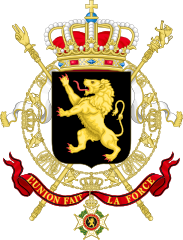Then I apologize for misinterpreting what you meant.

Over these years, the claim that legitimate female-line descendants do not deserve a title because of "tradition" yet Delphine deserves a title (even though that also goes against "tradition") has been argued over and over by many royal watchers, whereas I think you are the first person on this forum who has made the argument based on the date of birth or legal recognition. I hope that helps to explain why I misunderstood your reference to "until Albert's descendants (1991 Royal Decree), titles were never passed through females".
However, I also never said the judges should have made their ruling valid for the past - only that they should have granted titles, for the future, in a consistent manner. Thus, since Delphine was granted titles for the future under article 2, living people who qualify under article 1 should likewise have been granted titles for the future.
I understand your argument: Delphine is different from other descendants outside the legitimate male lines (like Henri, Vittorio Emanuele, or Alexandra) because the others became legal descendants of a Belgian king before the 2015 decree, whereas Delphine only became a legal descendant of a Belgian king after the decree was in force.
However, the court judgment (at least the excerpts in the justice-en-ligne.be article I linked to; if you have access to more of the judgment, I would appreciate your sharing it) did not mention that distinction. In fact, the judges
rejected the argument that descendants should be treated differently depending on the timing of when they legally became a descendant of a king.
King Albert II's argument was the flipside of your own: He argued that the decree only granted titles to descendants whose royal parentage was established
before the decree. The court rejected his argument, saying it would be unconstitutional to discriminate on the basis of the time at which parentage was established. Quoting the judgment:
To decide otherwise would be to create a discrimination, or a difference in treatment without an objective criterion or reasonable justification, between the children and grandchildren in direct descent from King Albert II depending on the moment at which their filiation with King Albert II was established, which would violate articles 10 and 11 of the Constitution.
The Royal Decree's wording does not make distinctions based on time of birth/acknowledgement. (I linked to the full Decree in my earlier post, so I am confused by your comment "states that, from that moment on" because those words do not appear in the decree.)
I also don't think it was a distinction that King Philippe had in mind when he issued his decree. The palace's briefing to the media in 2015 did not state that the decree would only grant titles to descendants yet to be born. I have read the La Libre article you linked to, along with other press reports from 2015, and in context, reporters' comments such as "Le nouvel arrêté royal modifie la donne pour les membres de la famille royale à naître" (I think that is the one you quoted) refer to the fact that nobody living had their titles removed by the 2015 reform (unlike in Denmark recently). The decree was not intended to grant or remove royal titles, but to prevent the royal name "of Belgium" and the royal predicate "Royal Highness" from being passed on without limitation.



